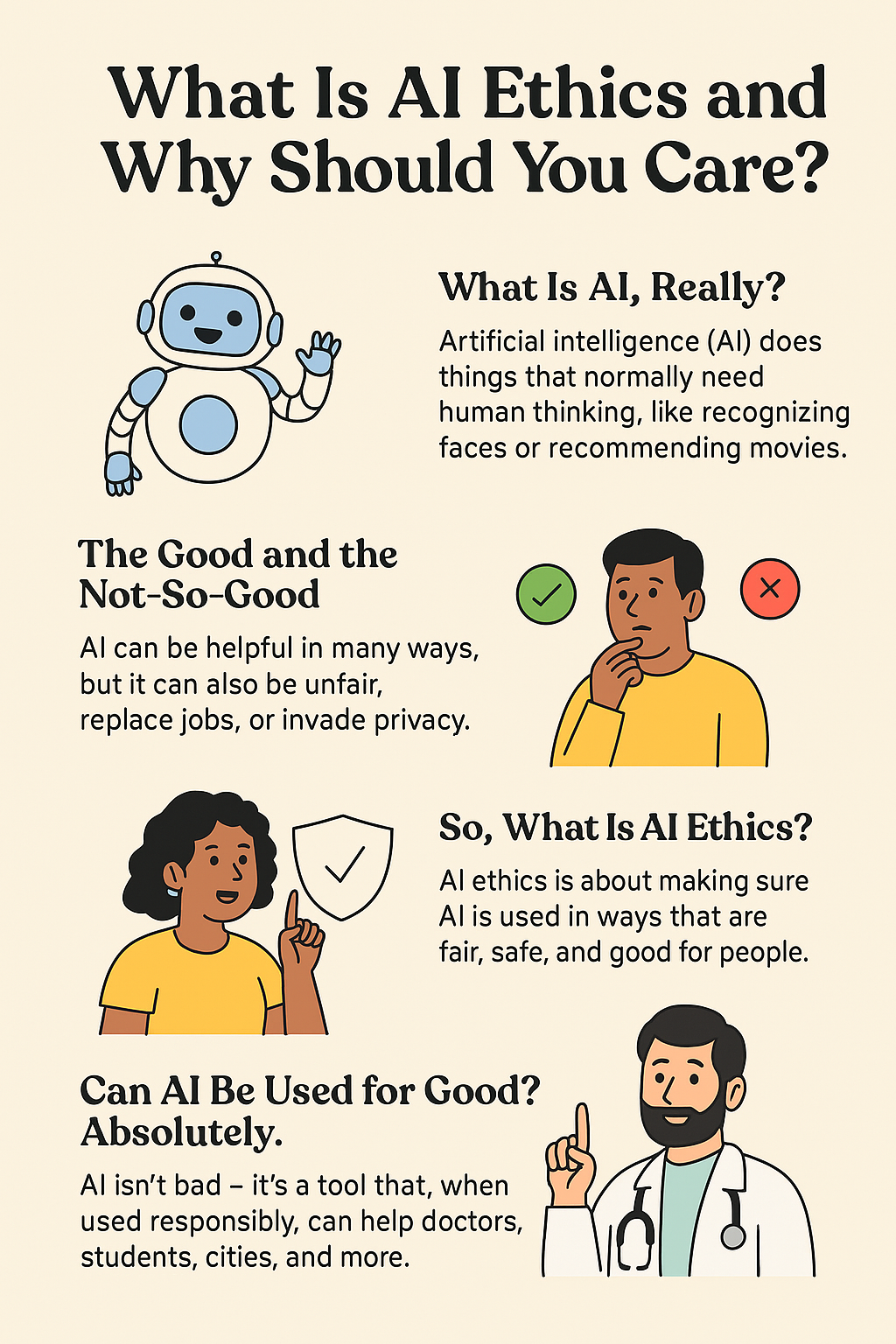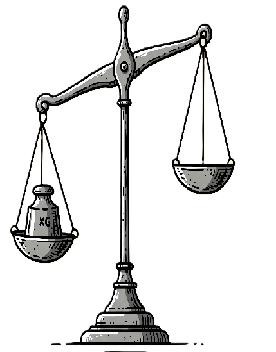
We use technology every day—scrolling on social media, watching videos, shopping online. But behind the scenes, a lot of that technology is powered by artificial intelligence (AI), and it’s changing how the world works. That’s why it’s important to talk about AI ethics—making sure AI is used in ways that are fair, safe, and good for people.
If you’re new to AI or ethics, don’t worry. This article will break things down in a simple, beginner-friendly way so that you can understand the importance of AI ethics and why it matters to all of us.
What Is Artificial Intelligence (AI)?
Let’s start with the basics. Artificial Intelligence (AI) is when machines are designed to mimic human thinking and behavior. This means doing tasks like recognizing faces, recommending songs, understanding speech, or even writing stories and answering questions like I’m doing now.
AI systems learn patterns from data. For example, if you watch a lot of cooking videos on YouTube, the platform’s AI learns what you like and recommends similar videos. That’s a simple form of AI in action.
There are many types of AI:
-
Basic AI follows simple rules.
-
Machine learning systems learn and improve over time.
-
Generative AI can create new content, such as art or music.
AI is already a part of our lives—even if we don’t always see it. It helps power:
- Navigation apps
- Voice assistants (Siri, Alexa)
- Customer service chatbots
The Good Side of AI
AI has a lot of potential to make our lives better. Here are a few examples:
- Healthcare: AI can help doctors detect diseases earlier and more accurately (e.g., analyzing X-rays or MRI scans).
- Education: AI can personalize lessons for students based on how they learn.
- Transportation: AI can reduce traffic and optimize public transit routes.
- Accessibility: AI tools (e.g., speech-to-text, image descriptions) assist people with disabilities.
- Entertainment: AI powers recommendations for music, movies, and more.
These examples show how AI can make life easier, more efficient, and safer.
The Risks and Problems of AI
Even though AI can be helpful, it also comes with risks—especially when used irresponsibly.
Common problems include:
- Bias: AI trained on biased data may make unfair decisions (e.g., favoring male job applicants).
- Job Loss: Automation can replace repetitive jobs, creating economic challenges.
- Privacy: AI often relies on collecting and analyzing personal data, raising privacy concerns.
- Misinformation: AI-generated deepfakes can spread fake videos or news.
- Lack of Transparency: The “black box” problem makes it hard to understand how AI makes decisions.
These issues stem from how AI is designed, trained, and used—not the technology itself.

What Is AI Ethics?
AI ethics is the field that asks: How can we use AI in ways that are fair, responsible, and aligned with human values?
It’s about ensuring AI helps people—not harms them. Key questions include:
- Is the AI fair and unbiased?
- Does it respect privacy?
- Who is accountable if something goes wrong?
- Is the system transparent and safe?
- Is it benefiting society—or just profits?
Ethical AI works for everyone, not just powerful companies.
Who Controls AI?
A major concern is that a few big tech companies (Google, Amazon, Meta, Microsoft, OpenAI) control the most powerful AI tools. Their business models often rely on surveillance capitalism—tracking user behavior for profit.
Ethical questions arise:
- Should one company have so much power?
- Can people question how these systems work?
- What if they’re used harmfully?
Concentrated power in AI is risky when decisions affect millions.
What Can Go Wrong Without Ethics?
Real-life examples:
- Facial Recognition: Misidentifies people of color, leading to wrongful arrests.
- Social Media Algorithms: Promote misinformation or hate speech for engagement.
- Job Screening AI: Rejects qualified candidates due to bias.
These show why ethics is critical—without it, AI can cause real harm.
Can AI Be Used for Good? Absolutely.
Ethical AI can positively impact:
- Climate Change: Modeling weather patterns, reducing waste.
- Disaster Relief: Predicting crises or tracking supplies.
- Healthcare: Supporting underserved regions with limited doctors.
- Education: Expanding access to learning resources.
To achieve this, AI must prioritize human values over profits.
What Should We Do About It?
Everyone has a role in shaping ethical AI:
- Raise awareness: Learn and share how AI works.
- Support policies: Advocate for laws that protect rights.
- Promote diversity: Ensure AI teams include varied backgrounds.
- Ask questions: Demand transparency from companies.
- Push for accountability: Require explanations for AI decisions.
- Use AI responsibly: Consider its impact on people.
The more we demand ethical AI, the better it will be.
Final Thoughts: AI Is About People

AI isn’t just about machines—it’s about how we live, work, and connect. It’s about fairness, safety, and dignity.
AI can build a better world, but only if we guide it responsibly.
Remember: AI is already here. We all have a say in how it’s used. Let’s choose a future where technology helps us be more human—not less.
Thanks for reading! For more beginner-friendly AI resources, check out StartAIJourney.com.
